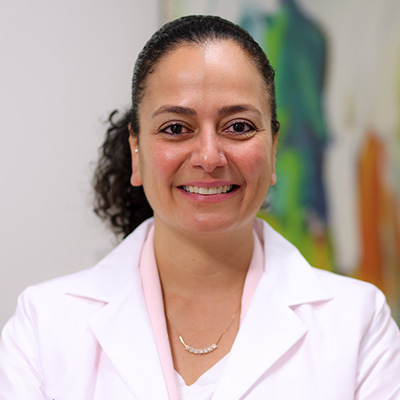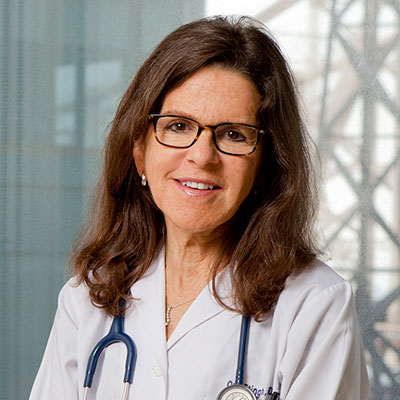From devising detailed care plans for complex pregnancies to providing mental health and wellness resources, care teams at NewYork-Presbyterian/
“We take care of women in a multidisciplinary fashion,” says Mirella Mourad, MD, a maternal-fetal medicine specialist who directs the Mothers Center and co-directs the Preterm Birth Prevention Center at NewYork-Presbyterian/
The Mothers Center provides highly individualized maternal health care coordinated across disciplines for women during pregnancy, with a focus on extremely high-risk cases. For patients with preexisting conditions, who often have medically or surgically complex pregnancies, this comprehensive, multidisciplinary approach starts from preconception, through conception, and into the postpartum period. “We follow patients who are already seeing physicians from other disciplines,” says Dr. Mourad. Her team sees cardiac patients, for instance, who have received lifelong cardiology care for heart conditions or congenital heart defects and have been told that they wouldn’t be able to sustain a safe pregnancy. “We collaborate a lot with the cardiology department, and others, to start the conversation during preconception. We meet the patient, talk to her about her conditions and how they are going to affect the pregnancy and potentially affect the fetus, and what our treatment plan is going to be.”
We collaborate a lot with the cardiology department, and others, to start the conversation during preconception. We meet the patient, talk to her about her conditions and how they are going to affect the pregnancy and potentially affect the fetus, and what our treatment plan is going to be.
— Dr. Mirella Mourad
From there, the care team creates a detailed outline of what the pregnancy could look like in terms of appointments, ultrasounds, care with other disciplines, labor and delivery, and the postpartum period. “Then when the patient gets pregnant, she registers for care with us and we carry through with the plan,” Dr. Mourad says. Often, care may involve cardiologists and cardiothoracic surgeons, neurologists and neurosurgeons, gastroenterologists, endocrinologists, urologists, immunologists, and others, with the Mothers Center facilitating access to these specialists immediately before, during, and after childbirth.
Dr. Mourad discusses placenta accreta spectrum disorder and other complex cases tackled at NewYork-Presbyterian.
Similarly, the Iris Cantor Women’s Health Center at NewYork-Presbyterian/
We are very big proponents of collaboration across specialties, and our doctors are integrally connected.
— Dr. Orli Etingin
For instance, patients with blood clotting disorders may experience fertility issues and, if they do get pregnant, the pregnancy is very high-risk. However, Dr. Etingin says the multidisciplinary approach to managing all aspects of care can help make parenthood possible. “We have specialists in reproductive medicine, hematology, and women’s health who all work together to care for the mother-to-be to manage the complicated aspects of pregnancy,” she says.
Tackling Maternal Morbidity and Mortality
Maternal mortality rates have more than doubled over the past two decades, with persistent disparities among communities of color — challenges that NewYork-Presbyterian physicians are addressing through thought leadership and research.
Every year, about four in 10 pregnant people are impacted by sepsis, a leading cause of maternal morbidity that disproportionately impacts Black, Asian/
“Sepsis can be a subtle diagnosis,” says Dr. Riley. “You may see a young woman who has normal vital signs for a long period of time until she quickly becomes very sick. It’s not unusual for the pulse to be a little faster and blood pressure to be a little lower during pregnancy, but these signs may also be due to a patient developing sepsis.”
Sepsis can be a subtle diagnosis. You may see a young woman who has normal vital signs for a long period of time until she quickly becomes very sick.
— Dr. Laura Riley
Dr. Riley and other experts produced standards for sepsis management to be used nationwide by providers caring for people during and after pregnancy. “One of the major foci of this bundle is its appeal to people working in emergency rooms and family practitioners. Those are likely to be spaces where cases have gone undetected because women show up in the ER four weeks after delivery, and no one puts together that their symptoms might be related to maternal sepsis.”
Similarly, postpartum hemorrhage is a leading cause of maternal mortality and accounts for approximately 11% of maternal deaths in the United States and an estimated 25% of maternal deaths worldwide. Dena Goffman, MD, a maternal-fetal medicine specialist at NewYork-Presbyterian/
This device treats hemorrhage quickly and effectively, allowing patients to resume postpartum activities shortly after birth. Having this option to treat birthing persons with severe postpartum bleeding could help reduce morbidity and mortality associated with this all-too-common complication of childbirth.
— Dr. Dena Goffman
“Our studies found that using low-level vacuum to promote uterine contraction helped to resolve postpartum hemorrhage safely and rapidly,” says Dr. Goffman. “This device treats hemorrhage quickly and effectively, allowing patients to resume postpartum activities shortly after birth. Having this option to treat birthing persons with severe postpartum bleeding could help reduce morbidity and mortality associated with this all-too-common complication of childbirth.”
Supporting Maternal Mental Health
The complications of pregnancy go beyond the physical, and clinicians across the institution treat mental and emotional health as a key component of maternal care. New research shows mental health conditions are the leading cause of pregnancy-related mortality in the U.S., and an estimated 10% to 20% of women will experience a mood or anxiety disorder during the perinatal period.
Lauren M. Osborne, MD, a reproductive psychiatrist and Vice Chair for Clinical Research for the Department of Obstetrics and Gynecology at NewYork-Presbyterian/
At NewYork-Presbyterian/
We can improve outcomes for new parents and infants by applying our knowledge of how parents’ well-being affects their offspring before birth and our understanding of what happens to the parental brain during and after pregnancy.
— Dr. Catherine Monk
Women can also find reproductive psychiatric care at NewYork-Presbyterian Westchester Behavioral Health, where Leah Susser, MD, a reproductive psychiatrist, works closely with clinicians to care for pregnant women with co-occurring mental health conditions.
The combined focus across the institution on the physical, mental, and emotional health of pregnant patients is ultimately in pursuit of one goal: Helping people with the dream of parenthood have safe and healthy deliveries. "If you have a patient with a medical issue in pregnancy and you refer her to us, we will take care of her using all the teams she needs," says Dr. Mourad. "We'll work with you to make sure your patients have a safe journey during pregnancy to help achieve an excellent outcome together."










